Search Images
Browse Content (p. 789)
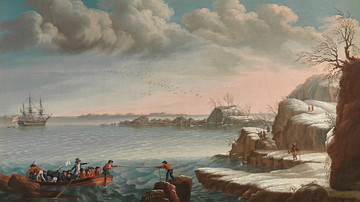
Image
Landing of the Pilgrims by Michele Felice Cornè
"Landing of the Pilgrims" (c. 1803 CE) is a painting by Michele Felice Cornè (1752–1845 CE). It depicts the Pilgrims who travelled to Plymouth Rock aboard the Mayflower in 1620 CE. Courtesy of the Diplomatic Reception Rooms, U.S. Department...
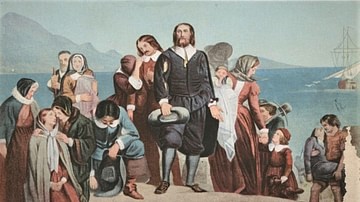
Image
Landing of the Pilgrims by Charles Lucy
"Landing of the Pilgrims", also known as "The Landing of the Pilgrim Fathers in America, A. D. 1620", (1848 CE) is a painting by Charles Lucy (1814–1873 CE). White House copy of the painting. (From The White House Historical Association)

Image
Basilica Palladiana, Vicenza by Palladio
The town hall or Basilica Palladiana in Vicenza, Italy. It was designed by Andrea Palladio (1508-1580 CE). Commissioned in 1546 CE. The arch and column ensemble became known as the 'Palladian window'.
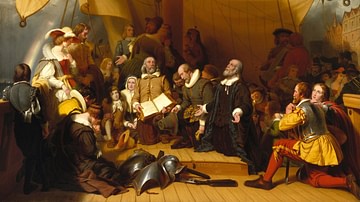
Image
Embarkation of the Pilgrims
"Embarkation of the Pilgrims", a painting by Robert Walter Weir (1803-1889 CE). It depicts a group of Pilgrims departing Holland aboard the Speedwell, which transported them to Dartmouth where they rendezvoused with the Mayflower in 1620...

Image
Mayflower in Plymouth Harbor
A postcard depicting the Mayflower in Plymouth Harbor, Massachusetts. Made by the Detroit Publishing Company after 1898 CE.
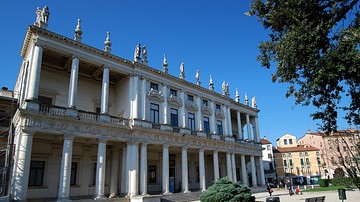
Image
Palazzo Chiericati, Vicenza by Palladio
Palazzo Chiericati, Vicenza, Italy. It was designed by Andrea Palladio (1508-1580 CE) c. 1550 CE.
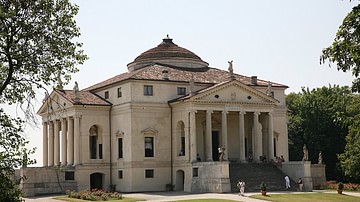
Image
Villa 'La Rotonda' by Palladio
The Villa Valmarana, aka ‘La Rotonda’, near Vicenza, Italy. It was designed by the Renaissance architect Andrea Palladio (1508-1580 CE) c. 1551 CE.

Image
Mourt's Relation
Frontispiece of "Mourt's Relation," published in 1622 CE in London. It is the earliest published account of the Mayflower voyage and the foundation of Plymouth Colony in Massachusetts.

Image
San Giorgio Maggiore Church, Venice
The San Giorgio Maggiore Church in Venice. Designed by Andrea Palladio (1508-1580) in 1566, although not completed until 1610.
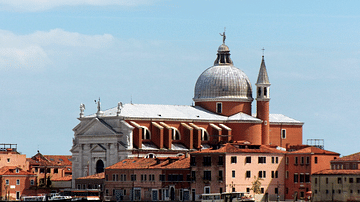
Image
Il Redentore, Venice by Palladio
Il Redentore church, Venice, designed by Andrea Palladio (1508-1580 CE) in 1576 CE.